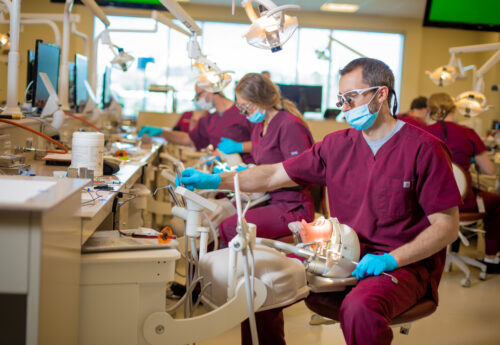Doctor of Dental Medicine (DMD) Curriculum

Uniting the Heart & Science of our Integrated Educational Model
At Roseman University, College of Dental Medicine, our students enter the clinic during their first month to begin the transition into becoming a clinician. The integration of biomedical sciences, behavioral sciences, and clinical sciences early on enables our students to understand the importance of all aspects of the curriculum in providing compassionate care to our patients. Understanding a full picture of your patient, their family and other dynamics, through the integrated curriculum, allows you to provide the best person-centered care.
Overview of Curricular Themes for Roseman College of Dental Medicine (CODM)
During the BF theme, students acquire the biological principles that underlie the normal and abnormal function of human organ systems with focus on the head and neck region and oral cavity. Roseman CODM students experience the biomedical sciences in an integrated curriculum that coordinates morphology, anatomy, physiology, pathology and pharmacology for the organ systems of the human body and the head and the neck region (craniofacial) after completing an interdisciplinary review of biologic foundations.
The goals of the CPD theme are to provide CODM students with a set of non-surgical clinical skills that will allow them to contribute to patient care early in their dental school career, and provide them with opportunities to explore the ethical and social responsibilities of health care professionals in society, learn laws and regulations that govern the practice of dentistry, and examine dental care for patients with special needs.
During the DCF theme, students acquire the therapeutic concepts, knowledge of biomaterials and instruments, as well as the technical skills to assess, diagnose, and manage oral diseases of the hard and soft tissues, and to restore health, function, and structure.
During this theme, students explore the community health care environment including strategies for dental practice management. Students learn fundamental concepts of public health and epidemiology with emphasis on assessment, promotion and risk prevention related to oral health in the community. Students also learn business management concepts pertinent to establishing and maintaining a dental practice. Strategies for evidence-based practice are also introduced, with emphasis on critical appraisal of the biomedical literature to make informed patient care decisions and maintain currency in professional knowledge.
Students acquire the knowledge, skills, and experience needed to develop competency in patient assessment, diagnosis, treatment planning and providing dental therapy for patients under faculty supervision in the Roseman CODM Primary Care Clinic and at community oral health clinics in the fourth year.